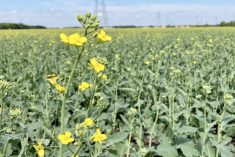Grain handler and processor Viterra is taking its plans to build the world’s biggest canola crusher to its Prairie home town.
The North American arm of Rotterdam-based Viterra said Monday it’s in the “feasibility” stage of designing and finalizing plans for what it bills as the “world’s largest integrated canola crush facility” in the northeast of Regina, about seven km from its downtown head office.
Construction would begin in early 2022, toward a late 2024 startup producing fully-refined vegetable oils for food-grade and biodiesel-grade end-users, the company said.
Read Also

U.S. grains: Wheat futures rise on supply snags in top-exporter Russia
U.S. wheat futures closed higher on Thursday on concerns over the limited availability of supplies for export in Russia, analysts said.
The Viterra plant’s targeted crush capacity, initially, would be 2.5 million tonnes of canola per year.
That figure would put it ahead of Winnipeg rival Richardson International’s plans for its existing canola plant at Yorkton, Sask., about 185 km northeast of Regina. Richardson last month announced a major expansion to be completed by early 2024, bringing the Yorkton plant’s annual capacity to about 2.2 million tonnes.
Asked Monday about the total cost of the project as proposed, Kyle Jeworski, Viterra’s CEO for North America, said the company is “continuing to refine” that figure, but added it would be the company’s “largest single investment in a site in Canada ever.”
“Oilseed crush demand is expected to continue strengthening in the long term, given continued demand growth for canola oil in food usage, as well as increases in meal consumption in animal feed markets,” Viterra said Monday in a release.
The Regina plant also “will play a key role in supplying the feedstock required for renewable fuel production,” which the company said would support the federal government’s planned Clean Fuel Standard.
Viterra already operates three North American oilseed crush plants — at Becancour, Que., Ste. Agathe, Man. and Warden, Washington — all of which were built by previous owners. The Regina plant would mark “the first time that we are constructing a greenfield facility” for canola crushing, Jeworski said.
Putting the Regina plant’s scope and size in perspective, Jeworski said, “if this facility was an export destination, it would be larger than our Japanese market for seed, larger than our Mexican market for seed… in an average year it would be our second-largest destination.”
The new plant would also feature “the latest technology,” he said, in terms of handling efficiency and limting emissions.
Unlike the Ste. Agathe and Warden plants, which specialize in expeller-pressed canola oil, the Regina plant would be a “traditional” hexane-extraction canola plant, he said.
Asked about Viterra’s plans against the current market picture for canola, Jeworski said that “anytime you continue to add demand, I think that’s good for the farmer; I think it’s good for Canada, in terms of continuing to diversify our markets — and we’re diversifying markets with the safest market in the world, which is our own.”
‘All directions’
Saskatchewan Premier Scott Moe, in a separate release, hailed Viterra’s announcement as “align(ing) with our Growth Plan goals, bringing us to our target to crush 75 per cent of the canola produced in our province at home in Saskatchewan.”
Completion of the project depends on “successful negotiation and finalization of various permits, licensing, agreements with third parties and final approvals both internally and externally,” Viterra said.
The project site, Jeworski said, is on a parcel on the edge of Regina for which the company has been working with city officials for “a considerable amount of time.”
For this kind of project, the company is looking at “access to sufficient labour, which Regina has, but on top of that (the site) has excellent access for both road and rail,” Jeworski said, noting the province’s recent investments in bypass infrastructure, which would allow the plant to “access canola seed from all directions very effectively.”
Viterra’s announcement comes just days after the Canadian arm of agrifood firm Cargill announced plans for its own smaller canola crush plant at a not-yet-decided location in the Regina area, for completion in early 2024. Cargill on Thursday also pledged upgrades for its own existing crush plants at Camrose, Alta. and Clavet, Sask.
Those oilseed sector announcements also follow Federated Co-operatives’ (FCL) decision earlier this month to buy the assets of biodiesel processor True North Renewable Fuels.
The co-operative, however, has objected to Regina city council’s $4 million land sale for what turns out to be the Viterra plant — just to the north of FCL’s existing fuel refinery complex.
Writing April 11 to Regina Mayor Sandra Masters, FCL vice-president Pam Skotnitsky said that land sale “jeopardizes our planned investments and would force us to select a location apart from the city of Regina.”
FCL’s April 9 announcement, Skotnitsky said, had “highlighted our interest in locating a renewable diesel facility adjacent to the Co-op Refinery Complex.” — Glacier FarmMedia Network
















